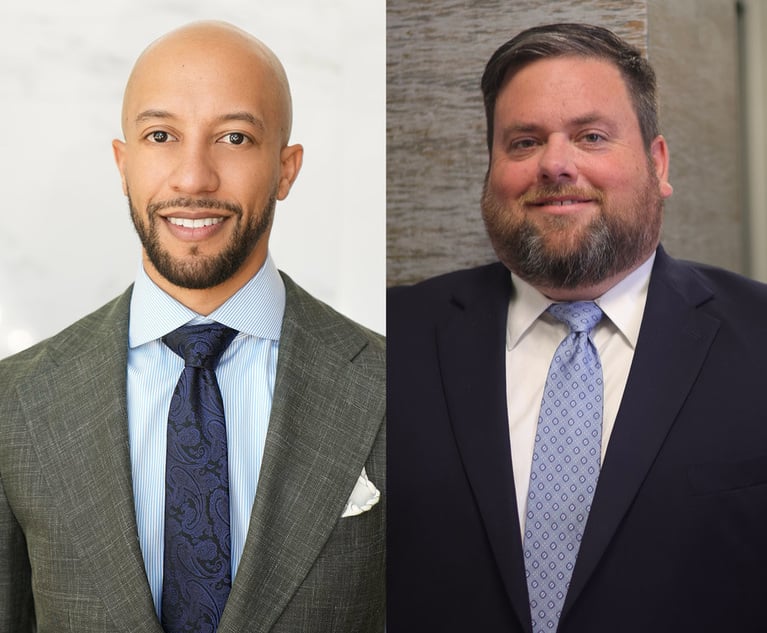Appeals Court Tosses $10.6M Judgment Against Albany Over Killing at Club
In a 2-1 ruling, the Georgia Court of Appeals said sovereign immunity protected the city of Albany from liability for renewing an occupancy license for a crime-plagued recording studio where a young man was murdered.
June 28, 2018 at 05:17 PM
7 minute read
 With a 2-1 vote, the Georgia Court of Appeals has thrown out a $10.6 million verdict against the city of Albany, which was sued after a man was killed at a violence-plagued unlicensed nightclub the city had allowed to stay in business while prosecutors and police investigated criminal activity there. The majority opinion, authored by Judge Charlie Bethel, with the concurrence of recently appointed Judge Elizabeth Gobeil, said the city is protected by sovereign immunity. Presiding Judge John Ellington dissented, arguing that long-standing legal precedent makes clear that sovereign immunity does not protect a municipality for the maintenance of a “nuisance” that is “dangerous to life and health.” The ruling sets up another potential dive into the breadth of sovereign immunity for the Georgia Supreme Court, where a series of rulings in recent years has steadily narrowed the ability of plaintiffs to sue government entities or challenge statutes. “W e certainly believe Judge Ellington's dissent correctly explains the problem the majority's opinion creates with the current state of the law and will continue to pursue all avenues on appeal, including a petition for certiorari to the Georgia Supreme Court,” said Virgil Adams of Macon's Adams, Jordan & Herrington, who represents the plaintiffs with partners James Jordan and Caroline Herrington. On appeal, Albany was represented by a team of Freeman, Mathis & Gary attorneys Sun Choy, Jacob Daly and Wesley Jackson, Georgia Municipal Association Associate General Counsel Rusi Patel and Albany City Attorney C. Nathan Davis. Choy and Daly said the majority opinion simply aligns with court precedent since a 1993 Georgia Supreme Court ruling shielding the city of Rome from liability for failing to dispatch emergency responders after several 911 calls, leading to a woman's suffering serious injury. That case was City of Rome v. Georgia, 426 S.E.2d 861. Choy said he was confident the ruling would survive challenge if accepted at the high court. “When we first heard about this judgment down in Albany, I was surprised it even went to a jury,” Choy said. “These are big public policy decisions that have already been made,” he said. “Under the broad nature of 'nuisance,' as applied by statute and common law, by definition the city would always have knowledge of crime being committed.” “[The plaintiffs] are really complaining that the city did not close Brick City down,” said Daly, referring to the nightclub. “The law is crystal clear: whether or not to yank their license is clearly a governmental function, and is constitutionally protected without a specific waiver of sovereign immunity. ”At the end of the day, it's all about policing decisions,” he said. As far as holding a municipality responsible for a third party's actions, “there's not a single case allowing that,” said Choy. The case involved the 2010 Valentine's Day murder of 20-year-old LaSheldon Stanford at the now-defunct club, nominally a recording studio that was also the site of numerous reported crimes. A raid uncovered evidence of alcohol sales, drugs and guns. Brick City did not have a license to serve alcohol. Albany code enforcement recommended that Brick City's occupancy license be pulled, but a hearing on this issue never happened because the local district attorney and police wanted to further investigate crime there. Two days after the license was reissued, Edwards said, a fight broke out and Stanford was shot six times and killed. The shooter, Shenard Smith, was convicted of murder and is serving a life sentence. Two weeks later, the city council revoked Brick City's license. Stanford's parents filed a nuisance and negligence complaint against Albany and Brick City Productions' owners, Daniel and Molly Loving, who never responded to the suit. After a trial before Dougherty County Superior Court Judge Willie Lockette, the jury awarded $15.2 million in damages, apportioning 70 percent of the liability — more than $10.6 million — to the city. The city filed a motion for judgment notwithstanding the verdict or for a new trial, which Lockette denied. The city appealed on multiple grounds, but the appellate panel never got beyond the sovereign immunity issue. Bethel's majority opinion said that municipalities are granted sovereign immunity under the state's 1983 Constitution unless specifically waived by the Legislature, and that subsequent rulings have made clear that the courts “no longer have the authority to abrogate or modify the doctrine of sovereign immunity as they could when it was the product of the common law” instead of the Constitution. While there is legal precedent for municipalities being held liable for damages “caused from the operation or maintenance of a nuisance,” Bethel wrote, the “nuisance exception” the plaintiffs asserted “is not an exception at all, but a proper recognition that the Constitution itself requires just compensation for takings and cannot, therefore, be understood to afford immunity in such cases.” Georgia law provides a “narrow waiver” of sovereign immunity for “neglect to perform or for improper or unskillful performance of their ministerial duties,” but municipalities are still immune for acts that constitute a “governmental function.” “In the case before us, we conclude that the city was exercising a governmental function when it opted not to revoke the occupational tax certificate of Brick City,” Bethel wrote. Ellington said his fellow judges got it wrong. Citing the Court of Appeals' 1996 ruling in Hibbs v. City of Riverdale, 267 Ga. 337, Ellington wrote that while sovereign immunity protects a city from negligence claims arising from a governmental function, "it may be liable for damages it causes to a third party from the creation or maintenance of a nuisance.” In this case, the “nuisance at issue is dangerous to life and health,” Ellington said. The majority's opinion “writes this longstanding and important exception to the protection of sovereign immunity out of Georgia law.” Daly, one of Albany's lawyers, said the majority opinion represented sound public policy. “In our brief we talked about the amount of the jury verdict in relation to the city of Albany's budget,” he said, noting that $10.6 million was more than 17 percent of the city's general fund budget for 2018. “That could mean dire consequences for other city services,” he said. Allowing Ellington's interpretation to prevail could also threaten the solvency of hundreds of small municipalities around the state, said Daly.
With a 2-1 vote, the Georgia Court of Appeals has thrown out a $10.6 million verdict against the city of Albany, which was sued after a man was killed at a violence-plagued unlicensed nightclub the city had allowed to stay in business while prosecutors and police investigated criminal activity there. The majority opinion, authored by Judge Charlie Bethel, with the concurrence of recently appointed Judge Elizabeth Gobeil, said the city is protected by sovereign immunity. Presiding Judge John Ellington dissented, arguing that long-standing legal precedent makes clear that sovereign immunity does not protect a municipality for the maintenance of a “nuisance” that is “dangerous to life and health.” The ruling sets up another potential dive into the breadth of sovereign immunity for the Georgia Supreme Court, where a series of rulings in recent years has steadily narrowed the ability of plaintiffs to sue government entities or challenge statutes. “W e certainly believe Judge Ellington's dissent correctly explains the problem the majority's opinion creates with the current state of the law and will continue to pursue all avenues on appeal, including a petition for certiorari to the Georgia Supreme Court,” said Virgil Adams of Macon's Adams, Jordan & Herrington, who represents the plaintiffs with partners James Jordan and Caroline Herrington. On appeal, Albany was represented by a team of Freeman, Mathis & Gary attorneys Sun Choy, Jacob Daly and Wesley Jackson, Georgia Municipal Association Associate General Counsel Rusi Patel and Albany City Attorney C. Nathan Davis. Choy and Daly said the majority opinion simply aligns with court precedent since a 1993 Georgia Supreme Court ruling shielding the city of Rome from liability for failing to dispatch emergency responders after several 911 calls, leading to a woman's suffering serious injury. That case was City of Rome v. Georgia, 426 S.E.2d 861. Choy said he was confident the ruling would survive challenge if accepted at the high court. “When we first heard about this judgment down in Albany, I was surprised it even went to a jury,” Choy said. “These are big public policy decisions that have already been made,” he said. “Under the broad nature of 'nuisance,' as applied by statute and common law, by definition the city would always have knowledge of crime being committed.” “[The plaintiffs] are really complaining that the city did not close Brick City down,” said Daly, referring to the nightclub. “The law is crystal clear: whether or not to yank their license is clearly a governmental function, and is constitutionally protected without a specific waiver of sovereign immunity. ”At the end of the day, it's all about policing decisions,” he said. As far as holding a municipality responsible for a third party's actions, “there's not a single case allowing that,” said Choy. The case involved the 2010 Valentine's Day murder of 20-year-old LaSheldon Stanford at the now-defunct club, nominally a recording studio that was also the site of numerous reported crimes. A raid uncovered evidence of alcohol sales, drugs and guns. Brick City did not have a license to serve alcohol. Albany code enforcement recommended that Brick City's occupancy license be pulled, but a hearing on this issue never happened because the local district attorney and police wanted to further investigate crime there. Two days after the license was reissued, Edwards said, a fight broke out and Stanford was shot six times and killed. The shooter, Shenard Smith, was convicted of murder and is serving a life sentence. Two weeks later, the city council revoked Brick City's license. Stanford's parents filed a nuisance and negligence complaint against Albany and Brick City Productions' owners, Daniel and Molly Loving, who never responded to the suit. After a trial before Dougherty County Superior Court Judge Willie Lockette, the jury awarded $15.2 million in damages, apportioning 70 percent of the liability — more than $10.6 million — to the city. The city filed a motion for judgment notwithstanding the verdict or for a new trial, which Lockette denied. The city appealed on multiple grounds, but the appellate panel never got beyond the sovereign immunity issue. Bethel's majority opinion said that municipalities are granted sovereign immunity under the state's 1983 Constitution unless specifically waived by the Legislature, and that subsequent rulings have made clear that the courts “no longer have the authority to abrogate or modify the doctrine of sovereign immunity as they could when it was the product of the common law” instead of the Constitution. While there is legal precedent for municipalities being held liable for damages “caused from the operation or maintenance of a nuisance,” Bethel wrote, the “nuisance exception” the plaintiffs asserted “is not an exception at all, but a proper recognition that the Constitution itself requires just compensation for takings and cannot, therefore, be understood to afford immunity in such cases.” Georgia law provides a “narrow waiver” of sovereign immunity for “neglect to perform or for improper or unskillful performance of their ministerial duties,” but municipalities are still immune for acts that constitute a “governmental function.” “In the case before us, we conclude that the city was exercising a governmental function when it opted not to revoke the occupational tax certificate of Brick City,” Bethel wrote. Ellington said his fellow judges got it wrong. Citing the Court of Appeals' 1996 ruling in Hibbs v. City of Riverdale, 267 Ga. 337, Ellington wrote that while sovereign immunity protects a city from negligence claims arising from a governmental function, "it may be liable for damages it causes to a third party from the creation or maintenance of a nuisance.” In this case, the “nuisance at issue is dangerous to life and health,” Ellington said. The majority's opinion “writes this longstanding and important exception to the protection of sovereign immunity out of Georgia law.” Daly, one of Albany's lawyers, said the majority opinion represented sound public policy. “In our brief we talked about the amount of the jury verdict in relation to the city of Albany's budget,” he said, noting that $10.6 million was more than 17 percent of the city's general fund budget for 2018. “That could mean dire consequences for other city services,” he said. Allowing Ellington's interpretation to prevail could also threaten the solvency of hundreds of small municipalities around the state, said Daly.This content has been archived. It is available through our partners, LexisNexis® and Bloomberg Law.
To view this content, please continue to their sites.
Not a Lexis Subscriber?
Subscribe Now
Not a Bloomberg Law Subscriber?
Subscribe Now
NOT FOR REPRINT
© 2025 ALM Global, LLC, All Rights Reserved. Request academic re-use from www.copyright.com. All other uses, submit a request to [email protected]. For more information visit Asset & Logo Licensing.
You Might Like
View All
Trial Court Had No Authority to Reopen Voir Dire After Jury Impaneled in Civil Case, State Appellate Court Rules

'Pushed Into Oncoming Traffic': $5.85M Settlement in Mediated Auto Tort
6 minute read
Justice Known for Asking 'Tough Questions' Resolves to Improve Civility
4 minute readTrending Stories
Who Got The Work
J. Brugh Lower of Gibbons has entered an appearance for industrial equipment supplier Devco Corporation in a pending trademark infringement lawsuit. The suit, accusing the defendant of selling knock-off Graco products, was filed Dec. 18 in New Jersey District Court by Rivkin Radler on behalf of Graco Inc. and Graco Minnesota. The case, assigned to U.S. District Judge Zahid N. Quraishi, is 3:24-cv-11294, Graco Inc. et al v. Devco Corporation.
Who Got The Work
Rebecca Maller-Stein and Kent A. Yalowitz of Arnold & Porter Kaye Scholer have entered their appearances for Hanaco Venture Capital and its executives, Lior Prosor and David Frankel, in a pending securities lawsuit. The action, filed on Dec. 24 in New York Southern District Court by Zell, Aron & Co. on behalf of Goldeneye Advisors, accuses the defendants of negligently and fraudulently managing the plaintiff's $1 million investment. The case, assigned to U.S. District Judge Vernon S. Broderick, is 1:24-cv-09918, Goldeneye Advisors, LLC v. Hanaco Venture Capital, Ltd. et al.
Who Got The Work
Attorneys from A&O Shearman has stepped in as defense counsel for Toronto-Dominion Bank and other defendants in a pending securities class action. The suit, filed Dec. 11 in New York Southern District Court by Bleichmar Fonti & Auld, accuses the defendants of concealing the bank's 'pervasive' deficiencies in regards to its compliance with the Bank Secrecy Act and the quality of its anti-money laundering controls. The case, assigned to U.S. District Judge Arun Subramanian, is 1:24-cv-09445, Gonzalez v. The Toronto-Dominion Bank et al.
Who Got The Work
Crown Castle International, a Pennsylvania company providing shared communications infrastructure, has turned to Luke D. Wolf of Gordon Rees Scully Mansukhani to fend off a pending breach-of-contract lawsuit. The court action, filed Nov. 25 in Michigan Eastern District Court by Hooper Hathaway PC on behalf of The Town Residences LLC, accuses Crown Castle of failing to transfer approximately $30,000 in utility payments from T-Mobile in breach of a roof-top lease and assignment agreement. The case, assigned to U.S. District Judge Susan K. Declercq, is 2:24-cv-13131, The Town Residences LLC v. T-Mobile US, Inc. et al.
Who Got The Work
Wilfred P. Coronato and Daniel M. Schwartz of McCarter & English have stepped in as defense counsel to Electrolux Home Products Inc. in a pending product liability lawsuit. The court action, filed Nov. 26 in New York Eastern District Court by Poulos Lopiccolo PC and Nagel Rice LLP on behalf of David Stern, alleges that the defendant's refrigerators’ drawers and shelving repeatedly break and fall apart within months after purchase. The case, assigned to U.S. District Judge Joan M. Azrack, is 2:24-cv-08204, Stern v. Electrolux Home Products, Inc.
Featured Firms
Law Offices of Gary Martin Hays & Associates, P.C.
(470) 294-1674
Law Offices of Mark E. Salomone
(857) 444-6468
Smith & Hassler
(713) 739-1250







